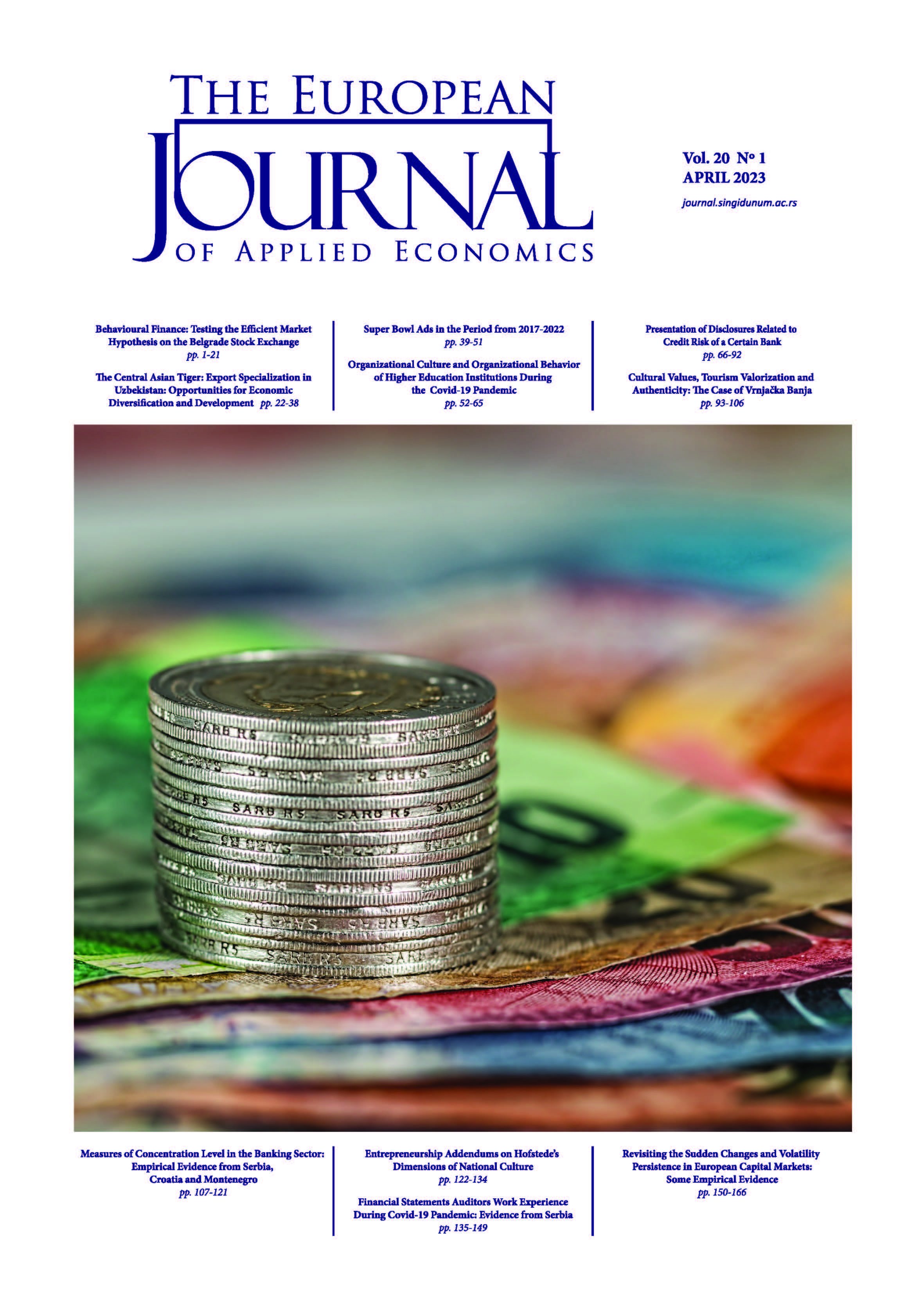ORGANIZATIONAL CULTURE AND ORGANIZATIONAL BEHAVIOR OF HIGHER EDUCATION INSTITUTIONS DURING THE COVID-19 PANDEMIC
Abstract
Purpose. The main goal of this paper is to define that, creating culture is essential in any organization and is necessary to know how to act in times of crisis. The creation of culture within an organization requires a structured and meticulous process in its implementation. The process must begin with the definition, by the organization's leadership team, of those characteristics that will form part of the common behavior of individuals within the company.
The desired behaviors are the attitudes, habits, beliefs, values, and forms of interaction that we want to install. In this sense, it is important to think about how we want to be recognized by our customers and employees.
Given the situation of COVID-19, we can say that different cultures can determine different behaviors for the same event. Culture is stronger than any business strategy and more influential than any individual member of the company: culture reflects the common behavior of the organization.
References
Aldag, R.J & Kuzuhara, L.W. (2001). Organizational Behavior and Management: An Integrated Skills Approach. Cincinnati: South-Western College Pub.
Ali, A.B.J., Ismail, F.B., Sharif, Z.M., Hamawandy, N.M., Abubakr, Z.A., Qader, K.S. & Othman, B. (2021). The organizational culture influence as a mediator between training development and employee performance in Iraqi Academic sector: University of Middle Technical. Journal of Contemporary Issues in Business and Government. 27(1), 1926-1961. https://www.researchgate.net/publication/349734257_The_organizational_culture_influence_as_a_mediator_between_training_development_and_employee_performance_in_Iraqi_Academic_sector_University_of_Middle_Technical
Alqarni, N.M., Mclaughlin, P., Al-Ashaab, A. & Aziz, N.A. (2022). Factors Influencing Organizational Culture to Facilitate Radical Innovation in Mature Manufacturing Organizations. Journal of Innovation & Business Best Practice. 2022 (2022), 1-21. https://ibimapublishing.com/articles/JIBBP/2022/752939/
Anees, R.T., Heidler, P., Cavaliere, L.P.L. & Nordin, N.A. (2021). Brain Drain in Higher Education. The Impact of Job Stress and Workload on Turnover Intention and the Mediating Role of Job Satisfaction at Universities. European Journal of Business Management and Research. 6(3), 1-8. DOI: https://doi.org/10.24018/ejbmr.2021.6.3.849
Bamidele, R. (2022). Organizational culture. Awka, Anambra State Nigeria: Fab Educational Books.
Banji, B.G.A. (2020). (SYSTEMATIC LITERATURE REVIEW) THE EFFECT OF WORKPLACE INCIVILITY AND PRODUCTIVITY. Project: EFFECT OF WORKPLACE INCIVILITY AND PRODUCTIVITY. https://www.researchgate.net/publication/342009485_TITLE_SYSTEMATIC_LITERATURE_REVIEW_THE_EFFECT_OF_WORKPLACE_INCIVILITY_AND_PRODUCTIVITY_PREPARED_FOR
Bojadjiev, M., Tomovska Misoska, A., Mirocevic, B. & Stefanovska, M. (2018). Organizational Culture and the "Voice" of Small Enterprises in the Electrical Engineering Service Sector in the Republic of Macedonia. Universal Journal of Management. 6(8), 263-272. DOI: https://doi.org/10.13189/ujm.2018.060801
Etxebarria, N.O., Santamaria, M.D., Mondragon, N.I. & Santxo, N.B. (2021). Estado Emocional Del Profesorado de Colegios y Universidades en el Norte de España Ante La COVID-19. Rev Esp Salud Pública, 95 (15),1-8. https://www.sanidad.gob.es/biblioPublic/publicaciones/recursos_propios/resp/revista_cdrom/VOL95/O_BREVES/RS95C_202102030.pdf
Fiori, M., Fischer, S. & Barabasch, A. (2022). Creativity is associated with higher well-being and more positive COVID-19 experience. Elsevier Personality and Individual Differences. 194 (111646), 1-4. DOI: https://doi.org/10.1016/j.paid.2022.111646
Greenberg, J. & Baron, R.A. (2008). Behavior in Organizations. Hoboken: Pearson.
Hofstede, G. (2011). Dimensionalizing Cultures: The Hofstede Model in Context. Online Readings in Psychology and Culture. 2(1), 1-26. DOI: https://doi.org/10.9707/2307-0919.1014
Ohadomere, O. & Ogamba, K.I. (2021). Management-led interventions for workplace stress and mental health of academic staff in higher education: a systematic review. The Journal of Mental Health Training, Education and Practice. 16 (1), 67-82. DOI: https://doi.org/10.1108/JMHTEP-07-2020-0048
Oldham, G.R. & Rotschford, N.L. (1983). Relationships between Office Characteristics and Employee Reactions: A Study of the Physical Environment. Sage Publications, Inc. 28 (4), 542-556. DOI: https://doi.org/10.2307/2393008
Poalses, J. & Bezuidenhout, A. (2018). Mental Health in Higher Education: A Comparative Stress Risk Assessment at an Open Distance Learning University in South Africa. International Review of Research in Open and Distributed Learning. 19 (2), 169-190. DOI: https://doi.org/10.19173/irrodl.v19i2.3391
Saravanakumar, A. (2020). Organizational Behavior. Karaikudi,Tamil Nadu, India: Alagappa University. https://www.researchgate.net/publication/340266415_ORGANIZATIONAL_BEHAVIOUR
Serpa, S. & Sa, M. (2022). Trust in Higher Education Management and Organizational Culture. 12 (1), 8-13. DOI: https://doi.org/10.36941/jesr-2022-0002
Spicer, A. (2020). Organizational culture and COVID-19. Journal of Management Studies. 57(8), 1737-1740. DOI: https://doi.org/10.1111/joms.12625
Tambunan, A.P.P., Mashud, M. & Ariadi, S. (2022). Covid-19 Pandemic and Transformation of Organizational Culture in Universities. SOSHUM Jurnal Sosial dan Humaniora [Journal of Social Sciences and Humanities]. 12 (1), 75-82. DOI: https://doi.org/10.31940/soshum.v12i1.75-82
Tientcheu, L & Thierry, V. (2021). Organizational Behaviour Strategy
Ugoani, J.N.N. (2020). Organizational Behaviour and its Effect on Corporate Effectiveness. International Journal of Economics and Financial Research. 6(6), 121-129. DOI: https://doi.org/10.32861/ijefr.66.121.129
UNESCO. (2022, November). UNESCO’s education response to COVID-19. Retrieved December 18, 2022, from https://www.unesco.org/en/covid-19/education-response/initiatives.


